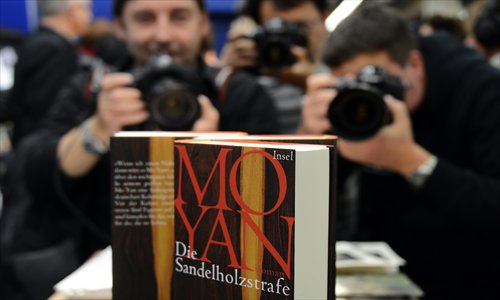Mo Yan takes Nobel Prize in historic win

Chinese author Mo Yan Thursday won the Nobel Prize in Literature, becoming the first Chinese citizen to do so.
"Through a mixture of fantasy and reality, historical and social perspectives, Mo Yan has created a world reminiscent in its complexity of those in the writings of William Faulkner and Gabriel Garcia Marquez, at the same time finding a departure point in old Chinese literature and in oral tradition," the Swedish Academy announced on Thursday.
Mo, 57, "with hallucinatory realism merges folk tales, history and the contemporary," the jury said.
"(I was) very surprised upon winning the prize because I felt I was not very senior in terms of qualification (among Chinese writers). There are many good writers and my ranking was not so high," Mo told reporters in his hometown of Gaomi in Shandong Province late Thursday, Xinhua reported.
This is the first time a Chinese national and the second time a Chinese-born writer has won the prize, after Gao Xingjian, who was given French citizenship in 1987, was honored in 2000.
Sales of Mo's works have increased at online bookshops in China this week. Mo's novel Frog (2009), which earned him the Mao Dun Literature Prize, China's most prestigious award for novels, was out of stock on dangdang.com, the country's leading online bookshop.
On Sina Weibo, China's most popular microblogging service, comments topped 3 million in just a few hours. Despite earlier sarcasm over Mo's "political passiveness," most Web users voiced their congratulations to the author and expressed national pride.
Zhang Yiwu, a professor of Chinese language and literature at Peking University, said that Mo deserves the prize for his achievement in literature, but added he was surprised that the honor came much earlier than he had expected.
"It was a historic breakthrough, which indicated the Nobel Academy's affirmative attitude toward China and Chinese culture. We should have stronger cultural confidence," Zhang told the Global Times.
Ye Yanbin, editor-in-chief of Shikan, a biweekly poetry journal, told the Global Times that given the world of literature has long been dominated by Western works, the win by Mo implies that Chinese literature is gradually receiving worldwide recognition.
"It seems the course of Sino-Western dialogue on an equal footing has been accelerating," said Ye.
According to Zhang, the academy's decision to give the award to Mo was made beyond the criteria for literature. "Collaboration with a big power like China was a consideration by Sweden," Zhang said.
However, Luan Meijian, a deputy director with the Research Center of Contemporary Chinese Literature at Fudan University, told the Global Times that the decision was in line with the Academy's focus on the depiction of human nature and humanist care.
According to Luan, before the toppling of the Gang of Four at the end of the Cultural Revolution (1966-76), most literary works served as a tool for politics. After that, such notions were reversed.
"Mo's works just reflected such changes. He had his stories focus on the grass roots and the bottom of society," commented Luan.
Ye also noted that the prize is associated with national pride in a country where the national consciousness is prevalent.
Despite the plaudits, Mo's win wasn't entirely met with positive comments.
Some people accused the writer of not taking a critical political stance against authorities. For example, Mo has been criticized for agreeing to transcribe in his own handwriting for a memorial book one of Mao Zedong's speeches in 1942 about revolutionary art and literature.
Zhao Chu, a columnist in Shanghai, wrote on his Weibo that Mo's win weakened the value of the Nobel Prize in Literature. Zhao's remarks were reposted more than 1,200 times.
Unlike the previous Chinese-born Nobel laureate Gao Xingjian, who was little known in the Chinese mainland, Mo is a mainstream writer in the country.
His masterpiece Red Sorghum (1987) was also made into an award-winning film by leading Chinese director Zhang Yimou.
Zhu Wei, editor-in-chief of Sanlian Lifeweek Magazine, said on his Weibo that the academy's decision this time showed that it recognized his depiction of Chinese people's lives and human nature.
"The social criticisms of Mo's works over the past 30 years were worth exploring and thinking about deeply," said Zhu. "Those who want to boycott him citing ideological reasons should read his works first."
Agencies contributed to this story